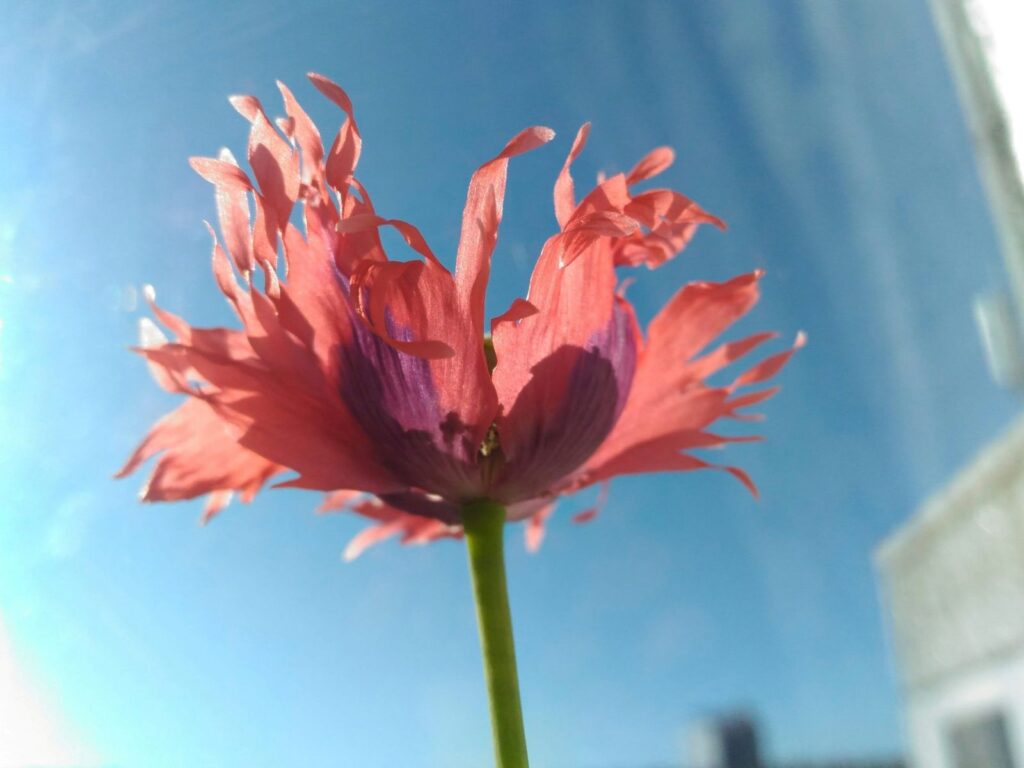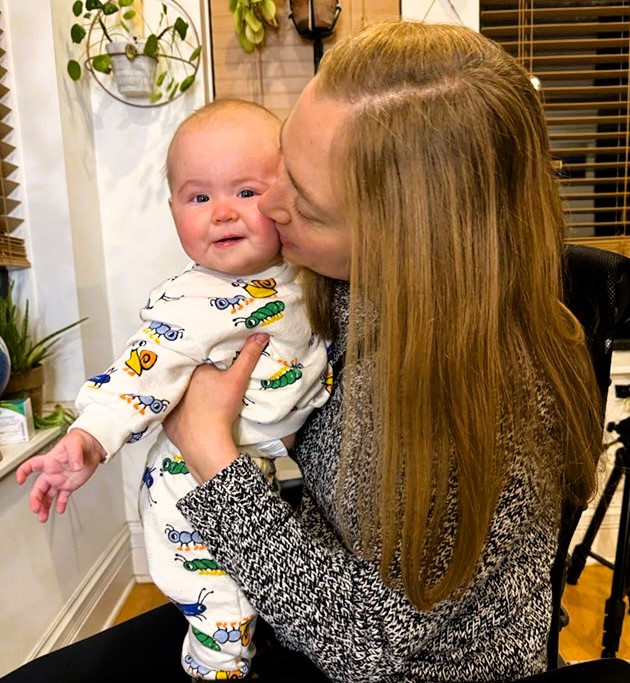I’ve had an interesting experience over the past month or so. People whom I thought I’d never see or talk to again have been resurfacing. Not one or two people, either – five. Folks that I haven’t seen, talked to, or thought of in one year, two years, three years, five years have been popping up in unexpected ways and places.
So often I get stuck in binary thinking: “This person is in my life forever,” or “They’re gone for good,” but life is reminding me I don’t actually know. I don’t know who will cycle in and out of life. I think I know. I want to know, but there’s evidence staring me in the face of how wrong I am. To be clear, resurfacing doesn’t always mean reconnecting. Sometimes people show up again only for you to say, “Ew. No. Hard pass.” But still. It’s interesting when people reenter your life.
The whole thing is reminding me of humility. I don’t mean humiliation or low self-esteem. The word “humility” originates from the Church Latin word humilis, which literally translates as “on the ground.” Other words that mean “Earth” are also part of the etymology of “humility.” Being humble means keeping your feet on the ground and staying present here on Earth.
In my post from two weeks ago about grounding in reality, I talked about discernment and using the mind to vet information. But what I’m also recognizing is that grounding in reality means accepting we just don’t know. We don’t know the future. We don’t know if a project is finished even if we think it is. We don’t know who we’ll be connected to a year from now, two years from now. We don’t really know anything.
As a journalist, as someone who loves investigating the truth in herself and others, this is incredibly humbling. Over and over again, life says to me, “You think you know what’s coming? Baby, you don’t have a freaking clue.” That can feel scary. Or at least it does for me. But this, too, is reality. And instead of spending countless hours trying to predict what will happen next, it’s better for me to be here, now.
Do I sound like a broken record? I kind of am right now because I’m trying to anchor in truth and reality. I’m trying to live the principles Eckhart Tolle talks about in The Power of Now. He says, “Most people treat the present moment as if it were an obstacle that they need to overcome. Since the present moment is life itself, it is an insane way to live.” The present moment is life itself. Life is what’s here, now, here now. Even the hard parts. Even the things I want to skip over.
Life is always a mixed bag – it will never be all good or all bad. This is why every happiness expert talks about gratitude and focusing on the positive. There will always be something negative. Always. That doesn’t go away. But what’s positive about the present moment? And can I stay humble, recognizing I don’t know what’s next? Can I remember it’s better for me to not even try to know? That’s what I’m working on, anyway. And life keeps sending me reminders when I forget.
I dream of a world where we stay humble. A world where we understand we don’t actually know if something is finished or whether a person will resurface in our lives. A world where we stop trying to predict the future and instead live here, now. Because the present isn’t an obstacle we need to overcome. The present is where life happens.
Another world is not only possible, it’s probable.
The title of this post comes from a fascinating article I read in my university’s alumni magazine. More than 15% of the global population – about 1 billion people – have been diagnosed with a physical, psychiatric, learning, developmental, sensory, or cognitive disability. And that number is likely to increase due to emerging diseases and natural disasters.
We treat disability like it’s abnormal but the reality is anyone who lives long enough will become disabled either because of an accident or age. For this reason, author and bioethicist Ashley Shew uses the term “temporarily able-bodied.” Yeeees. When I first heard that term, my entire body relaxed because it made so much sense and also reframed my experience as someone with idiopathic hypersomnia. Because I have to nap every day and am easily tired by too much activity, I perpetually feel abnormal. Why can’t I do the things other people can do? And how can I regain health privilege as quickly as possible?
Getting the reminder that people who aren’t currently disabled are experiencing something temporary helps me to feel better. It means I’m not abnormal and instead, other people are going to “catch up” to me, so to speak. I’m learning to live with disability sooner than other people but health privilege is temporary for everyone if they live long enough. To be alive means to have a body that will eventually break down. Instead of feeling envious of other people, I’m working to unapologetically love my body as it is, right now. There’s nothing wrong with me even though an ableist society says otherwise.
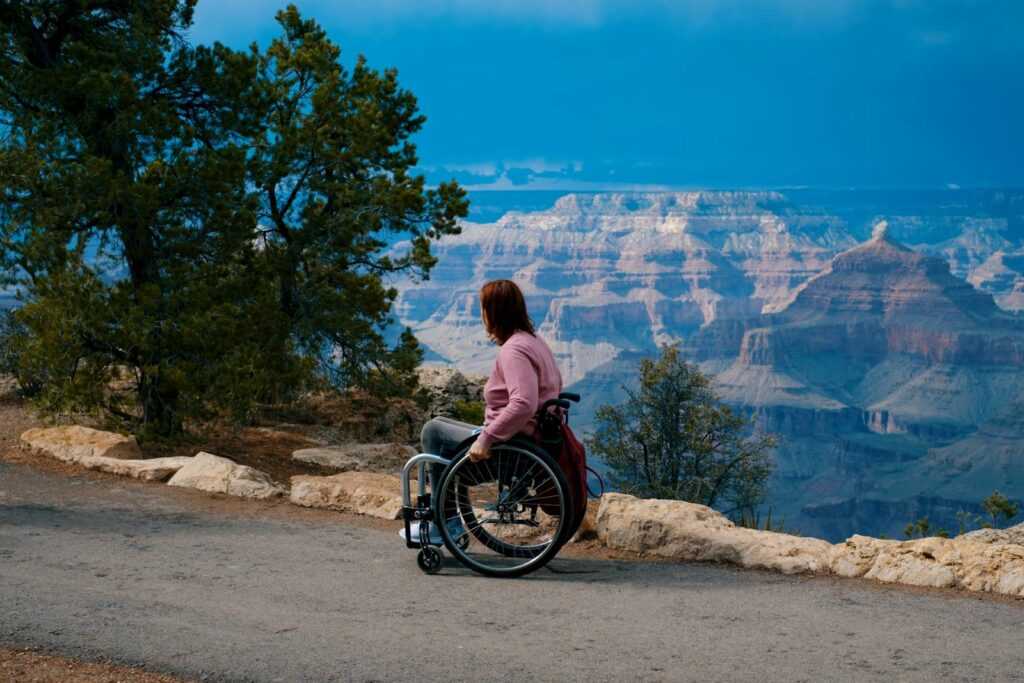
An excellent example of accessibility — not everyone can hike a rugged trail but paved trails allow those with mobility issues to see these natural wonders. Photo by Romain Virtuel on Unsplash
If you’re unfamiliar with that term, ableism is a system of discrimination and oppression that favors nondisabled lives and ways of being, often under the guise of empowerment. For instance, prosthetic legs enable amputees to walk “normally.” That’s not to say technology can’t make life easier for disabled people – it does – but society encourages disabled people to see themselves as chronically incomplete or lacking. There’s something wrong with them because they’re not able-bodied. This distracts from the real social ill, that “the world is set up to exclude disabled people,” to quote Shew.
The reality is we’re not all meant to be the same. My spiritual teacher says, “Human society is just like a garland which is made of different types of flowers, woven together by one common thread. The overall beauty of the garland is dependent upon the beauty of each flower. Likewise, each strata of society must be equally strengthened if we are to maintain the unity and solidarity of society.”
So first, diversity is the name of the game, and two, each strata of society must be equally strengthened. That means recognizing there is a place for everyone and furthermore, creating a more inclusive society that plans for the fact people are temporarily able-bodied. Instead of making people feel incomplete or ashamed for losing health privilege (or never having it in the first place), we’d be better off recognizing disability is inevitable. What are we doing to make the world easier, better, more inclusive, and more accommodating? Because after all, the future is disabled.
I dream of a world where we understand health is a privilege that eventually everyone loses. A world where instead of trying to hold on to health privilege, we create a society that accommodates disability. A world where we strengthen all segments of society because we recognize disability is a fact of life. A world where we recognize the diversity of human beings is beautiful, just like a garland.
Another world is not only possible, it’s probable.
Many cultures, especially in the West, treat Earth as a set piece, the stage upon which life happens. There’s nature and then there’s humanity. We’re seen as separate and dominant. But as former NASA scientist James Lovelock stated in the 70s with the Gaia Hypothesis, we are not managers of the planet, we are the planet. We are a piece of the complex, self-regulating system. For instance, plants breathe in the carbon dioxide we emit and we breathe the oxygen they expel. They need us and we need them.
When Lovelock’s hypothesis first came out it was met with derision but not so anymore. The earth system scientist Tim Lenton at the University of Exeter said he and a number of scientists “now think in terms of the coupled evolution of life and the planet, recognizing that the evolution of life has shaped the planet, changes in the planetary environment have shaped life, and together they can be viewed as one process.”
Darwin said organisms compete and adapt to environments. Only the strongest survive and all that. But now, the new perspective is organisms continuously reshape their surroundings with intricate feedback loops of transformation. Climate & Capital Media Founder Peter McKillop writes, “This isn’t environmental romanticism. It’s a scientifically grounded understanding of planetary dynamics that demands a complete reimagining of our economic, technological, and social systems if we are to survive.”

We are nature and nature is us. Photo by Jon Flobrant on Unsplash
So no pressure or anything – just the survival of our species. It seems like a tall order but it all starts with a mindset shift. How often do we think of nature as being “out there”? A place we go to? As if we could ever get away from nature! Not only is the very ground we stand on nature, but we are nature too. Our bones are made of minerals that we obtain from the environment. Most of the elements in the human body, like carbon, oxygen, calcium, and iron, were created in stars. We, ourselves, are stardust.
We are not separate at all. The entire cosmos is like a spider web and if you pull on one thread, it vibrates the rest of them. I have a friend who acknowledges this every morning in his prayers. He says, “I am eternally grateful to be an integrated particle in the infinite universe of your wisdom and will, and to live in your abundance and prosperity receiving your guidance, strength, mercy, and protection.” I can’t help but wonder what would the world be like if we all felt this way? That we are an integrated particle that is only one part of a whole. What would the world be like if we remembered that nature isn’t “out there” or somewhere to get to but rather, we, ourselves, are nature?
This is essentially the point of my meditation practice, to remember not only the connection but the unity with all of creation. I am nature, nature is me. I am other humans, other humans are me. I am the Divine Beloved, the Divine Beloved is me. I am not separate from anything and nothing is separate from me. I frequently get amnesia on this point but that’s also why I meditate every day, not only so I remember the concept but act on it. Because when I do, I treat everyone and everything with more care, love, and respect and that’s something we could all use more of.
I dream of a world where we remember we are an integrated particle in this universe. A world where we understand we aren’t separate from anyone or anything and nothing is separate from us either. A world where instead of thinking of nature as being something “out there” we remember we are nature and act accordingly.
Another world is not only possible, it’s probable.
It’s the time of year when people are making resolutions, plans, and goals for themselves. They’re picturing who they want to be and what they want to do this year. Someone asked me if I had any resolutions and the answer is no because my biggest lesson of 2024 was, “Stay in the moment because you don’t have a clue how things will turn out.”
Over and over again life surprised me with curveballs both good and bad. Longtime friends drifted out of my life. New ones arrived on my doorstep. High-paying clients stopped providing me with work. New ones took their place. I couldn’t have predicted any of it. So instead of making lists of what I want to accomplish, I’m embracing something poet Mary Oliver said: “Keep some room in your heart for the unimaginable.” As someone prone to worry, the “unimaginable” is often synonymous with “terrible.” Things like, “An earthquake is going to swallow me up!” or, “My dear friend is going to get hit by a bus!”

What’s around the bend? We have no idea. Photo by Dirk Spijkers on Unsplash
I’m pretty sure that’s not what Mary Oliver meant when she said keep room for the unimaginable. I suspect she meant, “Allow room for wonder, possibility, and joy.” When I read her quote, I feel warmth in my heart and remember that good things can happen out of the blue like meeting new friends, getting accepted into a film festival, or finding out you’re pregnant. The unimaginable can be incredibly sweet even if it wasn’t planned.
What I’ve learned in an even deeper way over the past year is I’m not meant to know everything. Life isn’t meant to follow a script, or at least not one we have access to. My spiritual teacher says, “Human beings should always remember that living beings are only actors in the vast universal drama composed by [Cosmic Consciousness]. . . . One should remember: ‘We are only playing specific roles in a great drama. I will act properly according to the role I have been given in this drama.’ This is a person’s duty. It is meaningless for a person to think about anything more than this – about what is beyond oneʼs power.”
There are many, many things beyond my power but what I can control is how I’m showing up in the world. Am I overly focused on my plan, my story, and how I think things should go? Or am I softening into the great unknown and remembering to save room in my heart for the unimaginable? This year I’d like to do the latter. So maybe I have a New Year’s resolution after all.
I dream of a world where we remember life can be surprising and delightful. A world where we understand we are all actors in a drama we didn’t write and don’t have the script for. A world where in addition to our plans, we save room in our hearts for the joyfully unimaginable.
Another world is not only possible, it’s probable.
If you’re reading this on December 1, today is my 40th birthday. I’ve had numerous feelings about this birthday. I’ve cried many tears about it because I’m not at all where I thought I’d be at this age. I don’t have anything society told me I “should” have at 40 as a cis-het woman: I’m single, childless, and don’t own a home.
When I mentioned this to my sister, she said, “Yeah but those are normie milestones,” which put things into perspective because when have I ever been normal? (The answer: never.) I may not have the things society told me I “should” have, but there are other milestones that I’m proud of. I’ve been in recovery from an eating disorder for 15 years. It’s been so long that in the novel I’m writing about a bulimic, I completely forgot the main character would say mean things about her body on a daily basis. I’m so removed from that version of myself it literally didn’t occur to me that my character’s inner dialogue would be fatphobic and berating.
Speaking of writing, I’ve written three books – a memoir, a romantic comedy, and the current heroine’s journey novel about belonging and recovery from an eating disorder. When I wrote the romantic comedy, I said over and over again, “I don’t think I can write 50,000 words” because I never had. And I used to joke around that I couldn’t write fiction to save my life. Here I am with two novels under my belt.
Another milestone: My business, rebekahmoan.com, isn’t a part of the statistic about most businesses failing within the first five years. It’s been five years and it’s still going strong. It doesn’t look the way it did when I started but that to me shows I’m adaptable. I can change. Related, it’s harder to measure but I have done so much healing work. I’ve learned to soothe my inner child, be my own secure loving parent, feel my feelings, set boundaries, and communicate my needs. Years ago, I was an anxious, people-pleasing, scaredy cat terrified of standing up for herself. Through some incredibly difficult circumstances, that all changed.
I’ve worked hard for this version of myself and I’m proud of that. Of me. I’ve been in the trenches of my body, mind, and soul learning how to be the best version of myself and I can honestly say I’m healthier than I was at 30 in every possible way. (In large part that’s because my sleep disorder finally got sorted in 2018.) That’s amazing and worth celebrating.
This post is about me but I’m sharing it with you because I bet you also have milestones that society wouldn’t necessarily notice or celebrate like keeping a plant alive for three years, meditating every day for a month, or finally having friends when for so long you were alone.
Celebrating these unconventional milestones reminds me we are all unique incarnations of the Divine Beloved. The central tenet of my spiritual practice is the universe is coming to know itself through me and you. We are the human expression of divinity. We are not human beings having a spiritual experience, but spiritual beings having a human experience, to quote Pierre Teilhard de Chardin.
Other people who speak to this idea eloquently are Brian Swimme and Mary Evelyn Pope who write in their book Journey of the Universe, “[J]ust as the Milky Way is the universe in the form of a galaxy, and an orchid is the universe in the form of a flower, we are the universe in the form of a human. And every time we are drawn to look up into the night sky and reflect on the awesome beauty of the universe, we are actually the universe reflecting on itself. And this changes everything.”
We are the universe reflecting on itself and just as the Cosmos is vast, so are the experiences of human life. We’re not all meant to follow a neat and orderly direction or accomplish all the same things. We’re meant to be wholly ourselves and that means making new milestones.
I dream of a world where we’re proud of ourselves for the things we’ve accomplished even if no one else is. A world where we understand we’re all unique expressions of the Divine Beloved and that means we all express ourselves in different ways. A world where instead of comparing ourselves to other people, we make our own milestones.
Another world is not only possible, it’s probable.
My social media feed is serving up some pretty horrific things lately. There seem to be endless ways that people are cruel to one another and I know many people are worried that the recent U.S. elections will embolden more of that kind of behavior. But people aren’t only cruel, they’re also kind.
What follows are two examples that remind me people do still care about one another. I’m organizing a retreat for my spiritual community and the retreat site doesn’t have strong wifi throughout, which is a problem because our retreat will be a hybrid one. We need to borrow a wifi booster/extender and instead of buying a new one to use for literally five days, I emailed my tech friends. Wouldn’t you know it – one of them has an extender I can borrow.
You might be saying to yourself, “So? That’s such a small thing. And you asked a friend for help. That’s what friends do.” True. But also this weekend a Substack I subscribe to opened up the comments for people to “take one/leave one,” meaning ask for something they need like a beta reader and offer something like critiquing a query letter. There, too, people are supporting one another, not friends – strangers.
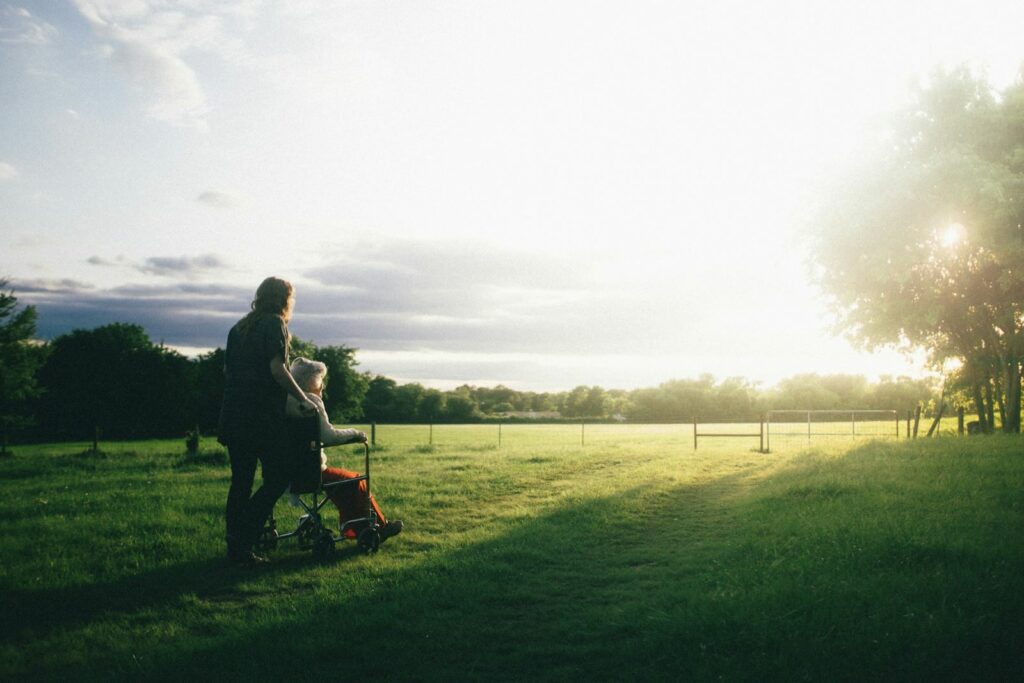
We are still kind to one another. Photo by Dominik Lange on Unsplash
These small things give me hope because this is always how the world works. We lean on one another for support and care. Dr. Clarissa Pinkola Estés wrote:
“Ours is not the task of fixing the entire world all at once, but of stretching out to mend the part of the world that is within our reach. Any small, calm thing that one soul can do to help another soul, to assist some portion of this poor suffering world, will help immensely. It is not given to us to know which acts or by whom, will cause the critical mass to tip toward an enduring good.
“What is needed for dramatic change is an accumulation of acts, adding, adding to, adding more, continuing. We know that it does not take everyone on Earth to bring justice and peace, but only a small, determined group who will not give up during the first, second, or hundredth gale.”
Her sentiment echoes the famous Margaret Mead quote: “Never doubt that a small group of thoughtful, committed citizens can change the world; indeed, it’s the only thing that ever has.” And don’t doubt that you are that citizen. The small things we do every day – lending wifi routers, offering to babysit someone’s children, bringing someone soup – these are the things that remind our brains and bodies that we aren’t alone. That people are still good and kind and helpful. That matters.
In times when it seems like people are hellbent on tearing one another down mentally, emotionally, and physically, these small acts of kindness are huge. They let us know despite the barrage of negativity, we still have each other. And that makes all the difference.
I dream of a world where we continue to show up for one another. A world where we give and receive what we can. A world where we focus on our circles of influence and help those around us. A world where we don’t let negativity drag us down because we remember that we still have each other.
Another world is not only possible, it’s probable.
I do that thing you’re not supposed to do and take many things personally. If someone doesn’t call me back, my mind assumes it’s because they don’t want to be friends anymore. If a new person in my life doesn’t respond to a text message, it’s because they secretly hate me. As I chatted about this with one of my soul sisters she said, “Even if someone hates you, it’s not personal.”
Um, excuse me? She reminded me that people are a complex mix of preferences, past experiences, and trauma such that even something that feels intensely personal like hatred isn’t actually personal. When she said that my brain short-circuited a little so I asked her to repeat it, which she did.
I’m someone who learns by example, even if it’s through language. An example that came to mind was blanket hatred. For instance, if someone says they hate dogs, is that really something personal? How can they hate all dogs? Is it because they were bitten as a child? Did they live next door to a dog that barked incessantly? With this example, it’s obvious the hatred of dogs isn’t personal because the person isn’t bothering to see each dog as an individual. They’re extrapolating from past experiences.

Look at this face! How could hatred be personal? Photo by Justin Veenema on Unsplash
It’s a little harder for me to apply this principle to humans but the questions are similar. If someone hates me, do I remind them of their mother, with whom they have a terrible relationship? Am I too similar to their older brother who was a bully? That’s not really about me then, is it? It’s about the other person and their previous relationships. This is exactly what Don Miguel Ruiz writes about in his book The Four Agreements, a book about personal freedom. The second agreement is, “Don’t take anything personally” and he says:
“Whatever happens around you, don’t take it personally … Nothing other people do is because of you. It is because of themselves. All people live in their own dream, in their own mind; they are in a completely different world from the one we live in. When we take something personally, we make the assumption that they know what is in our world, and we try to impose our world on their world.
“Even when a situation seems so personal, even if others insult you directly, it has nothing to do with you. What they say, what they do, and the opinions they give are according to the agreements they have in their own minds.”
We are all interfacing with the world in our own minds. Information is coming into each mind but it’s not filtering in the same way. Essentially, we all live in our own little worlds. I don’t know what’s going on for someone else because they’re living in their world and I’m living in mine. I like to pretend I know what’s happening in someone else’s world by making assumptions and taking things personally, but I know only a smidgen of what’s going on for them.
Have I suddenly stopped taking things personally after one conversation with one friend? Of course not but I feel a little better now. I’m more at peace with other people maybe not wanting to be friends or secretly hating me because instead of jumping to make it about me, I’m pausing. I’m reminding myself it’s not about me. It’s not personal even when it feels personal. And that, I think, is progress.
I dream of a world where we remember we’re all living inside our own minds, creating stories and characters. A world where we understand people are complex and come with their own histories that we often know nothing about. A world where we realize even if something feels personal, it’s not.
Another world is not only possible, it’s probable.
As I made plans with friends the other day, I said, “I know my nap schedule makes meals and things harder to work with.” I’m a spoonie and don’t have a lot of health privilege. I have some but require a daily nap and don’t bounce back easily from stress. When I flew home from Chicago the other week, I slept 11 hours each day of the weekend and took 1.5-hour naps. For context, I usually sleep about eight or nine hours a night and nap for half an hour, max. But even on normal days, a nap is crucial.
When, where, and how I’ll be able to nap is at the forefront of my mind as I make plans with people. And my comment to my friends also reveals that I apologize for my body. In implicit and explicit ways, I say, “I’m sorry I’m like this. I wish things were different. Thank you for bearing with me.” I’m not engaging in what Sonya Renee Taylor dubs “radical self-love” in her book The Body is Not an Apology.
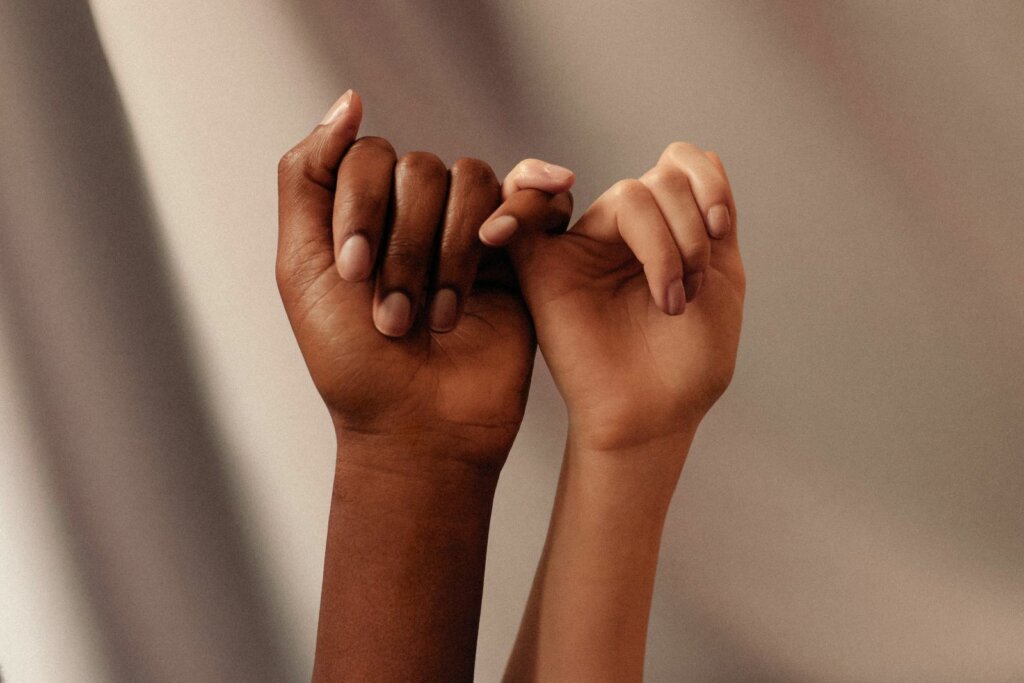
May we all make a promise to ourselves that we’ll stop apologizing for our bodies. Photo by Womanizer Toys on Unsplash
She says, “Concepts like self-acceptance and body neutrality are not without value. When you have spent your entire life at war with your body, these models offer a truce. But you can have more than a cease-fire. You can have radical self-love because you are already radical self-love.”
What she means is when we come into the world, we love our bodies. Babies are delighted by every part of their body. They look in the mirror and giggle or smile. No child starts off hating their body. That comes later when society barrages them with messages about how “wrong” they are for being too dark, too light, too tall, too short, too fat, too thin, too whatever. Or the converse: not enough. In our capitalistic, patriarchal, white supremacist society, there will always be something wrong with us because that’s how the systems keep running.
Under this toxic framework, which oftentimes feels overwhelming and permanent, it’s harder to blame a nameless, faceless system and instead, people turn inward and start blaming themselves. That’s when the apologizing begins. But Taylor asks some great questions: “What if we all became committed to the idea that no one should have to apologize for being a human in a body? … How might we change our lives? How might we change the world?”
I can think of lots of ways we’d change – like building wider airplane seats or ensuring every sidewalk corner has a curb cut. But on a more personal level, I can see how things could be different for me. In response to my body apology, my friends said, “Your nap schedule is not hard to work with at all! Honestly, it’s inspiring for both of us.” Their reply touched me deeply because the subtext was, “You’re not a burden. You’re OK just as you are. And we appreciate that you take care of yourself.”
It reminds me of that quote from the Buddha who said, “You yourself, as much as anybody in the entire universe, deserve your love and affection.” That means my body too. Not when it’s more energetic or more closely aligned with my idea of perfection, but now. In this iteration. Here. I can’t say I know exactly how to radically love my body – I suspect continuing to read Taylor’s book will help – but what I can do is be unapologetic about my body and that feels like a good place to start.
I dream of a world where we remember society will always tell us there’s something wrong with us. A world where we understand we can opt out of those messages. A world where we stop apologizing for our bodies because we realize they’re already lovely just as they are. A world where we practice radical self-love and treat ourselves as the precious beings we already are.
Another world is not only possible, it’s probable.
I keep thinking about a growth mindset versus a fixed mindset. A fixed mindset asserts that your intelligence, talents, and personality are fixed traits that cannot grow. There’s no improvement, there’s no change. A growth mindset is the opposite – it’s a belief that your intelligence, talents, and personality improve and change over time. However, instead of only applying the growth mindset to myself, as in, my novel-writing skills will improve, I also apply it to how I approach the world.
My spiritual tradition is a tantra-oriented practice, which if you break down the literal definition of tantra means liberation through expansion. In practice, tantra uses everything as a vehicle for liberation. That means every situation, every struggle, every everything is an opportunity to move closer to the Divine Beloved or further away.
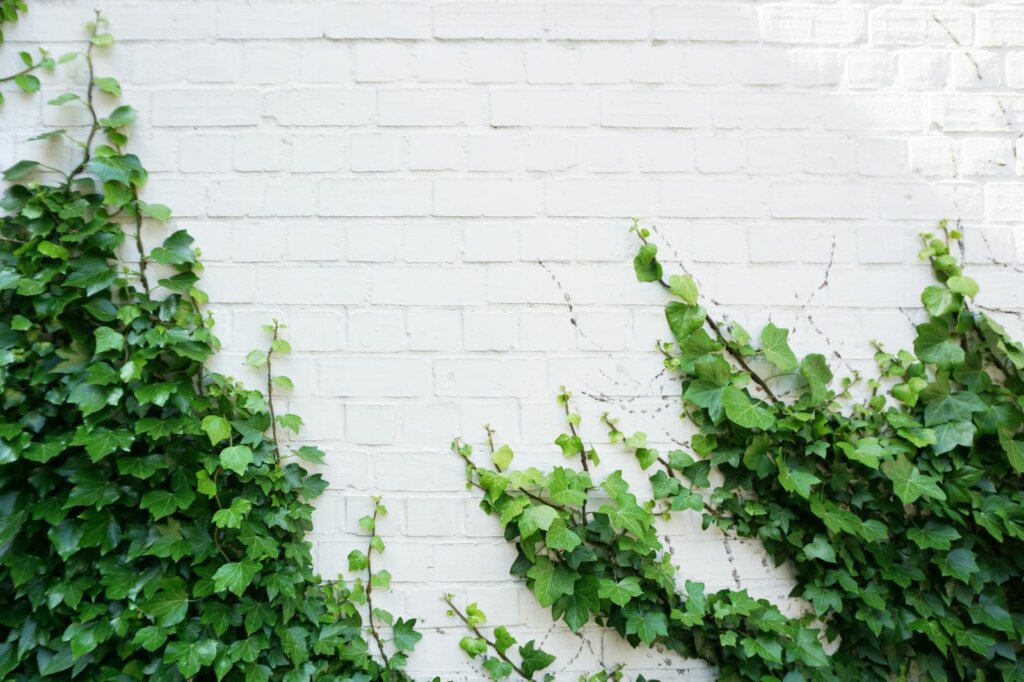
Grow, baby, grow! Photo by Victoria Strukovskaya on Unsplash
Here’s a silly, but perfect, example of how I use everything as a vehicle for liberation. In June 2016, I went to a cat café and none of the cats came up to me. I consider myself a cat person even though I don’t have one and usually, cats rub against me, want to sit on my lap, etc. But these cats didn’t and I was offended, especially because they came up to my friend. What the heck?!? Was she special and I wasn’t?!? Truly, it threw me into a tizzy and it’s what prompted my post, “You So Special.”
My interaction (or lack of interaction) with a random cat, once, spurred me to start affirming that I’m special and unique. It showed me that I was relying on other people to do that for me but using that method is like trying to fill up a colander with water – there are too many holes and the water will keep streaming out. I had to, and have to, give myself what I need first.
Bringing it back to tantra, my spiritual teacher says tantra is an all-around fight, both internally and externally. That means facing my fears, protesting injustice, and always asking, “How can I use this situation or experience to grow?” In my personal life, it also means becoming more accepting of whatever is in front of me because I understand it’s there for a reason and the reason is not to torture me.
My friend Ramesh Bjonnes, author of Tantra: The Yoga of Love and Awakening, wrote about this on Facebook in 2016 and I’m partially quoting him now. He said:
“In meditation, we do not deny anything, we actually become more accepting of everything, and in doing so, we realize where peace and true satisfaction is truly found – not in the fluctuating reality of the body and the mind, but in the stillness of the soul. And that stillness is so big that it contains everything, the only change is that our focus has changed, our identification has changed. It is from this state, we can more soulfully deal with pain, heartbreak, stress, and all the other stuff of life. This is the gift of meditation, to be able to dip into the ocean of the soul and thus return spiritually refreshed.”
Dipping into the ocean of the soul means taking a broader perspective. It means approaching life not from a fixed mindset of, “This will never change” or “I just need to find the right configuration of ____ to be happy.” It’s approaching life from a growth mindset of, “How can I grow from this situation? What can I learn?”
I dream of a world where we recognize we have a choice about how we approach life. A world where we understand we can view the things that happen to us from the standpoint of a victim or as something we have agency over. A world where we recognize we can grow from our experiences if we wish. A world where we have a different orientation toward the world that’s about moving us closer to the Divine Beloved.
Another world is not only possible, it’s probable.
Growing up, I was the weird kid because I didn’t fit in with my peers. I was a vegetarian in the 90s and my first-grade teacher announced to the class I didn’t eat meat because I was Jewish. (I think you know this but just in case, the two are not related.) I didn’t grow up in a bastion of diversity and understanding and that’s colored, well, a lot.
As an adult, I let my freak flag fly and usually have no problem standing out. I joke that my biography title should be: “Always the Outlier: The Rebekah Moan Story” because it’s true in 99% of cases that I’m the outlier. Over the past few weeks though, I notice parts of me are scared to be vulnerable and authentic. I realize a lot of people feel that way but that’s an unusual feeling for me. Normally, I don’t have a problem saying, “This is me. Here’s how I’m feeling,” but some parts of me feel terrified to do that because I’m worried people will run away screaming if I do.
When I shared that with a friend, she said, “Yeah because I haven’t seen the real you in our eight years of friendship.” I never said it made sense but that’s what wounding does. It makes us irrational. I’ve been ruminating over my experiences and a strong memory emerged from second grade when my music teacher went around the room and asked every child what their favorite music genre was. One by one, every child said, “country,” including me, even though I couldn’t name a country song to save my life. What I meant to say was “oldies” because that’s what my parents played around the house but I didn’t because the pressure to fit in was too great.
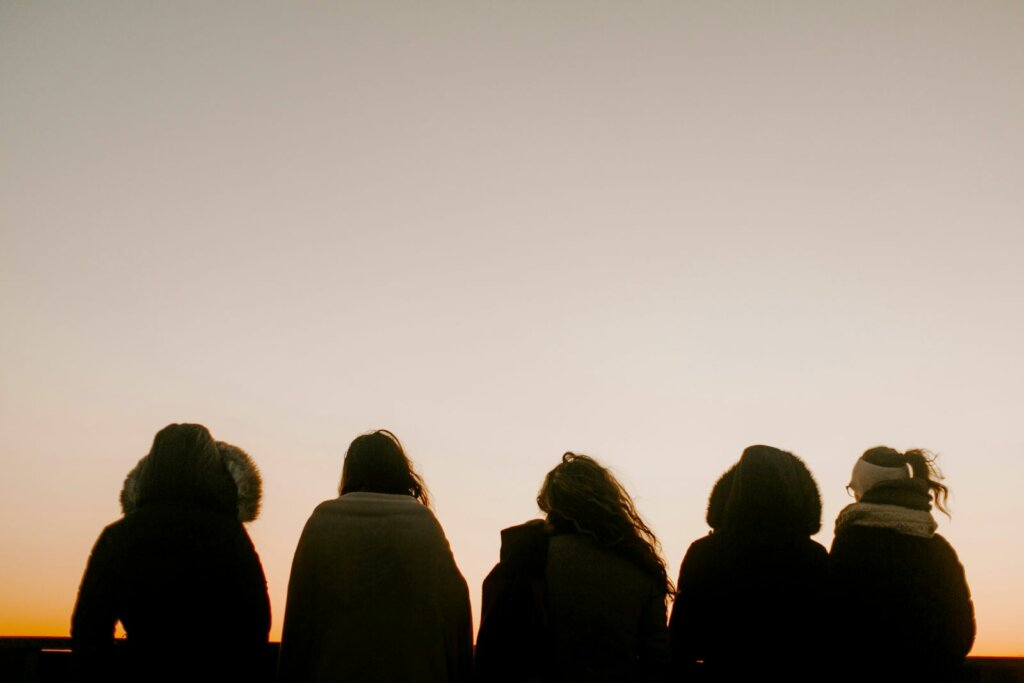
You belong somewhere, I promise. Photo by Annie Williams on Unsplash
Here’s the thing though – sure, in that setting every child said “country” but that doesn’t mean every child everywhere would have answered in the same way. I didn’t realize at that time I wasn’t weird, it’s more that I didn’t have anything in common with the people around me. That’s different. People who shared my interests existed in the world even if I didn’t go to school with them. What’s helping me to remember this is I organized a Zoom meetup for the young people in my spiritual community.
In our small group, we had people joining from London, Copenhagen, Moscow, and all over the U.S. Within the U.S., some people originally hailed from India, the Philippines, and Brazil. Only a handful of people live geographically close to me, which feels like the greatest gift, but also knowing there are people like me who live far away is a gift. It reminds me I do belong and there is a place for me. When I share that with the parts of me that feel like a weirdo, loser freak, they feel better too because I imagine a thread connecting me to each and every person in the world who is like me.
There’s a quote from C.S. Lewis who said, “Friendship is born at that moment when one person says to another: ‘What! You too? I thought I was the only one!’” Precisely. You’re not the only one even if sometimes it feels that way. You aren’t the only one even if the people around you are into different things. You already belong right here, right now and I hope you can feel that.
I dream of a world where we recognize someone, somewhere is into the things we’re into. A world where we remember that just because the people around us are into different things doesn’t mean we’re weird. A world where we recognize we may be far apart from the people who are most like us, but those people do exist. A world where we remember we already belong.
Another world is not only possible, it’s probable.
